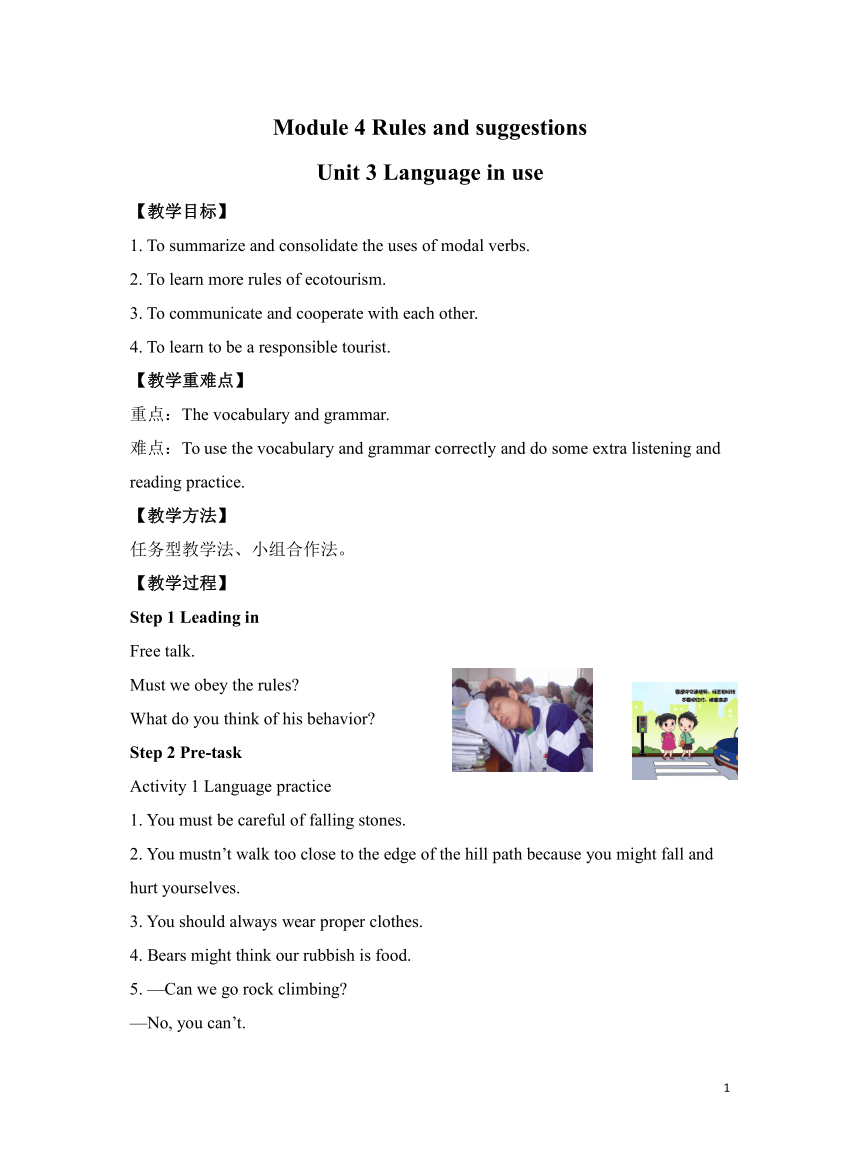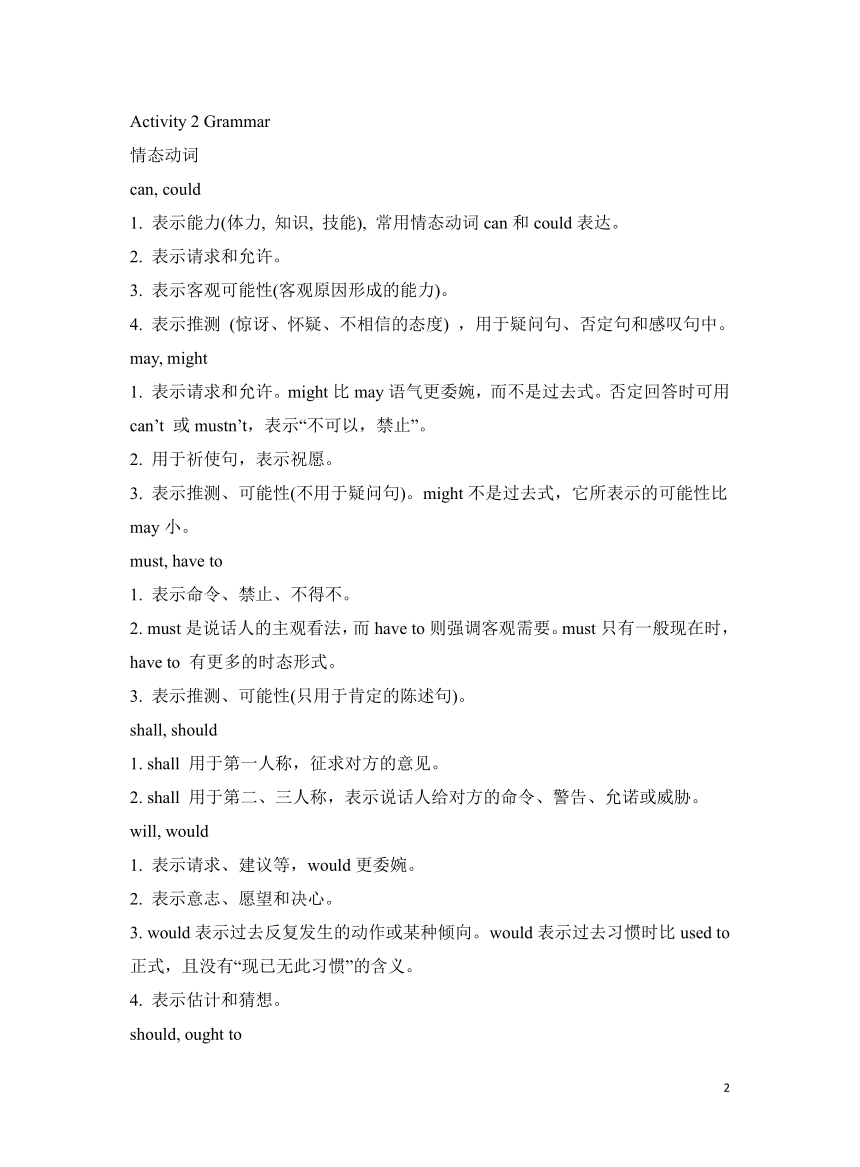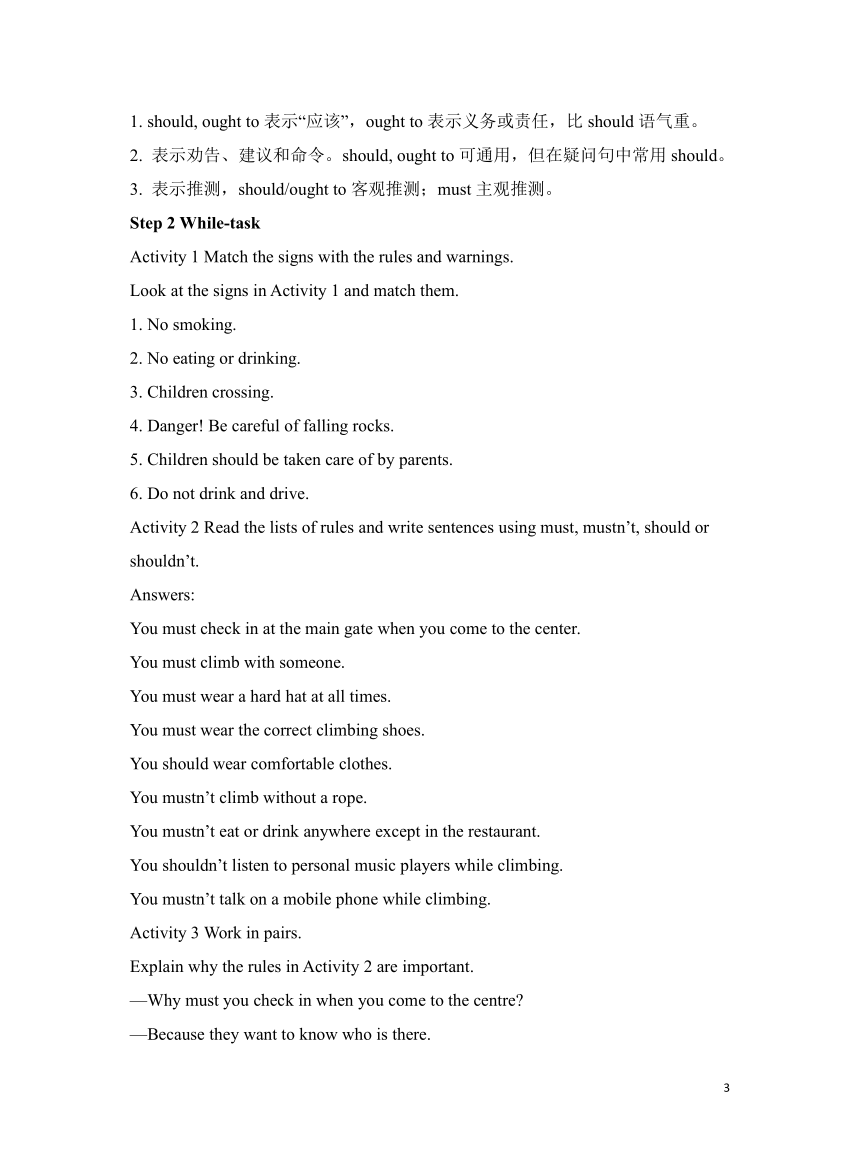初中英语外研版九下Module4Rules and suggestions Unit3教案
文档属性
| 名称 | 初中英语外研版九下Module4Rules and suggestions Unit3教案 |  | |
| 格式 | doc | ||
| 文件大小 | 300.0KB | ||
| 资源类型 | 教案 | ||
| 版本资源 | 外研版 | ||
| 科目 | 英语 | ||
| 更新时间 | 2023-08-30 17:30:18 | ||
图片预览



文档简介
Module 4 Rules and suggestions
Unit 3 Language in use
【教学目标】
1. To summarize and consolidate the uses of modal verbs.
2. To learn more rules of ecotourism.
3. To communicate and cooperate with each other.
4. To learn to be a responsible tourist.
【教学重难点】
重点:The vocabulary and grammar.
难点:To use the vocabulary and grammar correctly and do some extra listening and reading practice.
【教学方法】
任务型教学法、小组合作法。
【教学过程】
Step 1 Leading in
Free talk.
Must we obey the rules
What do you think of his behavior
Step 2 Pre-task
Activity 1 Language practice
1. You must be careful of falling stones.
2. You mustn’t walk too close to the edge of the hill path because you might fall and hurt yourselves.
3. You should always wear proper clothes.
4. Bears might think our rubbish is food.
5. —Can we go rock climbing
—No, you can’t.
Activity 2 Grammar
情态动词
can, could
1. 表示能力(体力, 知识, 技能), 常用情态动词can和could表达。
2. 表示请求和允许。
3. 表示客观可能性(客观原因形成的能力)。
4. 表示推测 (惊讶、怀疑、不相信的态度) ,用于疑问句、否定句和感叹句中。
may, might
1. 表示请求和允许。might比may语气更委婉,而不是过去式。否定回答时可用can’t 或mustn’t,表示“不可以,禁止”。
2. 用于祈使句,表示祝愿。
3. 表示推测、可能性(不用于疑问句)。might不是过去式,它所表示的可能性比may小。
must, have to
1. 表示命令、禁止、不得不。
2. must是说话人的主观看法,而have to则强调客观需要。must只有一般现在时,have to 有更多的时态形式。
3. 表示推测、可能性(只用于肯定的陈述句)。
shall, should
1. shall 用于第一人称,征求对方的意见。
2. shall 用于第二、三人称,表示说话人给对方的命令、警告、允诺或威胁。
will, would
1. 表示请求、建议等,would更委婉。
2. 表示意志、愿望和决心。
3. would表示过去反复发生的动作或某种倾向。would表示过去习惯时比used to 正式,且没有“现已无此习惯”的含义。
4. 表示估计和猜想。
should, ought to
1. should, ought to表示“应该”,ought to表示义务或责任,比should语气重。
2. 表示劝告、建议和命令。should, ought to可通用,但在疑问句中常用should。
3. 表示推测,should/ought to客观推测;must主观推测。
Step 2 While-task
Activity 1 Match the signs with the rules and warnings.
Look at the signs in Activity 1 and match them.
1. No smoking.
2. No eating or drinking.
3. Children crossing.
4. Danger! Be careful of falling rocks.
5. Children should be taken care of by parents.
6. Do not drink and drive.
Activity 2 Read the lists of rules and write sentences using must, mustn’t, should or shouldn’t.
Answers:
You must check in at the main gate when you come to the center.
You must climb with someone.
You must wear a hard hat at all times.
You must wear the correct climbing shoes.
You should wear comfortable clothes.
You mustn’t climb without a rope.
You mustn’t eat or drink anywhere except in the restaurant.
You shouldn’t listen to personal music players while climbing.
You mustn’t talk on a mobile phone while climbing.
Activity 3 Work in pairs.
Explain why the rules in Activity 2 are important.
—Why must you check in when you come to the centre
—Because they want to know who is there.
Activity 4 Complete the passage with the correct form of the words in the box.
although keep stream tourist worry
People are very (1) _______ about the conditions of the ancient forests of Canada and want to save them. Many visitors to the forests use knives to cut their names into the trees, some of which are hundreds of years old. (2) ________ there are litter bins, people still throw rubbish into the (3) ______ and this causes plants and fish to die.
People from local villages have helped clean up the forests. We hope (4) _______ will play their part in (5) _______ Canada’s forests clean too!
Now write possible rules for visitors to the forests
Activity 5 Complete the sentences with the words in the box.
gun smooth sticks stone sudden tent whenever
1. Come and visit me _________ you have time.
2. The wall is made of ______.
3. The path to the top is not very _______.
4. Remember to take a ____ with you to sleep in, because it might rain.
5. He lifted up the _____ and pointed it at the bear.
6. There was a ______ noise in the woods and we all stopped moving.
7. Birds use small ______ and leaves to make a home.
Activity 6 Read the passage and answer the questions.
1. What does Zhang Wenpeng try to say with his drawing
2. What does Zhou Zhiyun try to say with his painting
3. What does the school suggest the students should do
4. How can a school become a “green school”
Activity 7 Listen and complete the sentences.
1. The first thing you have to do is to ______________ carefully.
2. Think about where ____________________ and whether there are ________.
3. You should only take marked ________.
4. Make sure you know where ___________ for lunch.
5. Don’t forget to tell people to _________ for the picnic.
6. Don’t walk when it is ________ or in _________________.
7. You must not try out a ___________ with a group.
Step 4 Post-task
Activity 1 Around the world.
Read and answer:
1. What does ecotourism mean
2. List rules of ecotourism (at least three).
Activity 2 Work in pairs.
Discuss and give advice for visitors to China. Talk about:
visiting someone’s home
eating and drinking
travelling on public transport
behaving politely in public
visiting tourist sights
Then write your advice.
You must …
You mustn’t …
You should …
You shouldn’t …
Activity 3 Exercise.
单项选择。
1. —Must I hand in my homework now, Mr. Smith
—No, you _______.
A. can’t B. shouldn’t C. wouldn’t D. needn’t
2. —Excuse me, may I keep the book a little longer
—Sorry. You ________ return it today.
A. must B. mustn’t C. can D. can’t
3. —Is the man over there Mr. Brown
—It ____ him. He has gone to Brazil.
A. may not B. can’t be C. shouldn’t D. mustn’t
4. Children ____ sit in the front seat of a car. It’s too dangerous.
A. need B. needn’t C. must D. mustn’t
Step 5 Summary
1. We have revised model verbs.
2. We have learnt the rules to protect the environment.
Step 6 Homework
制作一个海报,宣传环保学校的做法。
【板书设计】
情态动词
can, could
1. 表示能力(体力, 知识, 技能)。
2. 表示请求和允许。
3. 表示客观可能性(客观原因形成的能力)。
4. 表示推测(惊讶、怀疑、不相信的态度),用于疑问句、否定句和感叹句中。
may, might
1. 表示请求和允许。might比may语气更委婉,而不是过去式。否定回答时可用can’t 或mustn’t,表示“不可以,禁止”。
2. 用于祈使句,表示祝愿。
3. 表示推测、可能性(不用于疑问句)。might不是过去式,它所表示的可能性比may小。
must, have to
1. 表示命令、禁止、不得不。
2. must是说话人的主观看法,而have to则强调客观需要。must只有一般现在时,have to有更多的时态形式。
3. 表示推测、可能性(只用于肯定的陈述句)。
shall, should
1. shall 用于第一人称,征求对方的意见。
2. shall 用于第二、三人称,表示说话人给对方的命令、警告、允诺或威胁。
will, would
1. 表示请求、建议等,would更委婉。
2. 表示意志、愿望和决心。
3. would表示过去反复发生的动作或某种倾向。would表示过去习惯时比used to 正式,且没有“现已无此习惯”的含义。
4. 表示估计和猜想。
should, ought to
1. should, ought to表示“应该”,ought to表示义务或责任,比should语气重。
2. 表示劝告、建议和命令。should, ought to可通用,但在疑问句中常用should。
3. 表示推测,should/ought to客观推测,must主观推测。
1
Unit 3 Language in use
【教学目标】
1. To summarize and consolidate the uses of modal verbs.
2. To learn more rules of ecotourism.
3. To communicate and cooperate with each other.
4. To learn to be a responsible tourist.
【教学重难点】
重点:The vocabulary and grammar.
难点:To use the vocabulary and grammar correctly and do some extra listening and reading practice.
【教学方法】
任务型教学法、小组合作法。
【教学过程】
Step 1 Leading in
Free talk.
Must we obey the rules
What do you think of his behavior
Step 2 Pre-task
Activity 1 Language practice
1. You must be careful of falling stones.
2. You mustn’t walk too close to the edge of the hill path because you might fall and hurt yourselves.
3. You should always wear proper clothes.
4. Bears might think our rubbish is food.
5. —Can we go rock climbing
—No, you can’t.
Activity 2 Grammar
情态动词
can, could
1. 表示能力(体力, 知识, 技能), 常用情态动词can和could表达。
2. 表示请求和允许。
3. 表示客观可能性(客观原因形成的能力)。
4. 表示推测 (惊讶、怀疑、不相信的态度) ,用于疑问句、否定句和感叹句中。
may, might
1. 表示请求和允许。might比may语气更委婉,而不是过去式。否定回答时可用can’t 或mustn’t,表示“不可以,禁止”。
2. 用于祈使句,表示祝愿。
3. 表示推测、可能性(不用于疑问句)。might不是过去式,它所表示的可能性比may小。
must, have to
1. 表示命令、禁止、不得不。
2. must是说话人的主观看法,而have to则强调客观需要。must只有一般现在时,have to 有更多的时态形式。
3. 表示推测、可能性(只用于肯定的陈述句)。
shall, should
1. shall 用于第一人称,征求对方的意见。
2. shall 用于第二、三人称,表示说话人给对方的命令、警告、允诺或威胁。
will, would
1. 表示请求、建议等,would更委婉。
2. 表示意志、愿望和决心。
3. would表示过去反复发生的动作或某种倾向。would表示过去习惯时比used to 正式,且没有“现已无此习惯”的含义。
4. 表示估计和猜想。
should, ought to
1. should, ought to表示“应该”,ought to表示义务或责任,比should语气重。
2. 表示劝告、建议和命令。should, ought to可通用,但在疑问句中常用should。
3. 表示推测,should/ought to客观推测;must主观推测。
Step 2 While-task
Activity 1 Match the signs with the rules and warnings.
Look at the signs in Activity 1 and match them.
1. No smoking.
2. No eating or drinking.
3. Children crossing.
4. Danger! Be careful of falling rocks.
5. Children should be taken care of by parents.
6. Do not drink and drive.
Activity 2 Read the lists of rules and write sentences using must, mustn’t, should or shouldn’t.
Answers:
You must check in at the main gate when you come to the center.
You must climb with someone.
You must wear a hard hat at all times.
You must wear the correct climbing shoes.
You should wear comfortable clothes.
You mustn’t climb without a rope.
You mustn’t eat or drink anywhere except in the restaurant.
You shouldn’t listen to personal music players while climbing.
You mustn’t talk on a mobile phone while climbing.
Activity 3 Work in pairs.
Explain why the rules in Activity 2 are important.
—Why must you check in when you come to the centre
—Because they want to know who is there.
Activity 4 Complete the passage with the correct form of the words in the box.
although keep stream tourist worry
People are very (1) _______ about the conditions of the ancient forests of Canada and want to save them. Many visitors to the forests use knives to cut their names into the trees, some of which are hundreds of years old. (2) ________ there are litter bins, people still throw rubbish into the (3) ______ and this causes plants and fish to die.
People from local villages have helped clean up the forests. We hope (4) _______ will play their part in (5) _______ Canada’s forests clean too!
Now write possible rules for visitors to the forests
Activity 5 Complete the sentences with the words in the box.
gun smooth sticks stone sudden tent whenever
1. Come and visit me _________ you have time.
2. The wall is made of ______.
3. The path to the top is not very _______.
4. Remember to take a ____ with you to sleep in, because it might rain.
5. He lifted up the _____ and pointed it at the bear.
6. There was a ______ noise in the woods and we all stopped moving.
7. Birds use small ______ and leaves to make a home.
Activity 6 Read the passage and answer the questions.
1. What does Zhang Wenpeng try to say with his drawing
2. What does Zhou Zhiyun try to say with his painting
3. What does the school suggest the students should do
4. How can a school become a “green school”
Activity 7 Listen and complete the sentences.
1. The first thing you have to do is to ______________ carefully.
2. Think about where ____________________ and whether there are ________.
3. You should only take marked ________.
4. Make sure you know where ___________ for lunch.
5. Don’t forget to tell people to _________ for the picnic.
6. Don’t walk when it is ________ or in _________________.
7. You must not try out a ___________ with a group.
Step 4 Post-task
Activity 1 Around the world.
Read and answer:
1. What does ecotourism mean
2. List rules of ecotourism (at least three).
Activity 2 Work in pairs.
Discuss and give advice for visitors to China. Talk about:
visiting someone’s home
eating and drinking
travelling on public transport
behaving politely in public
visiting tourist sights
Then write your advice.
You must …
You mustn’t …
You should …
You shouldn’t …
Activity 3 Exercise.
单项选择。
1. —Must I hand in my homework now, Mr. Smith
—No, you _______.
A. can’t B. shouldn’t C. wouldn’t D. needn’t
2. —Excuse me, may I keep the book a little longer
—Sorry. You ________ return it today.
A. must B. mustn’t C. can D. can’t
3. —Is the man over there Mr. Brown
—It ____ him. He has gone to Brazil.
A. may not B. can’t be C. shouldn’t D. mustn’t
4. Children ____ sit in the front seat of a car. It’s too dangerous.
A. need B. needn’t C. must D. mustn’t
Step 5 Summary
1. We have revised model verbs.
2. We have learnt the rules to protect the environment.
Step 6 Homework
制作一个海报,宣传环保学校的做法。
【板书设计】
情态动词
can, could
1. 表示能力(体力, 知识, 技能)。
2. 表示请求和允许。
3. 表示客观可能性(客观原因形成的能力)。
4. 表示推测(惊讶、怀疑、不相信的态度),用于疑问句、否定句和感叹句中。
may, might
1. 表示请求和允许。might比may语气更委婉,而不是过去式。否定回答时可用can’t 或mustn’t,表示“不可以,禁止”。
2. 用于祈使句,表示祝愿。
3. 表示推测、可能性(不用于疑问句)。might不是过去式,它所表示的可能性比may小。
must, have to
1. 表示命令、禁止、不得不。
2. must是说话人的主观看法,而have to则强调客观需要。must只有一般现在时,have to有更多的时态形式。
3. 表示推测、可能性(只用于肯定的陈述句)。
shall, should
1. shall 用于第一人称,征求对方的意见。
2. shall 用于第二、三人称,表示说话人给对方的命令、警告、允诺或威胁。
will, would
1. 表示请求、建议等,would更委婉。
2. 表示意志、愿望和决心。
3. would表示过去反复发生的动作或某种倾向。would表示过去习惯时比used to 正式,且没有“现已无此习惯”的含义。
4. 表示估计和猜想。
should, ought to
1. should, ought to表示“应该”,ought to表示义务或责任,比should语气重。
2. 表示劝告、建议和命令。should, ought to可通用,但在疑问句中常用should。
3. 表示推测,should/ought to客观推测,must主观推测。
1
同课章节目录
- Module 1 Travel
- Unit 1 We toured the city by bus and by taxi
- Unit 2 It's a long story.
- Unit 3 Language in use
- Module 2 Education
- Unit 1 They don't sit in rows.
- Unit 2 What do I like best about school?
- Unit 3 Language in use
- Module 3 Life now and then
- Unit 1 They sometimes work harder.
- Unit 2 I think life is better today.
- Unit 3 Language in use.
- Module 4 Rules and suggestions
- Unit 1 You must be careful of falling stones.
- Unit 2 we must keep the camp clean.
- Unit 3 Language in use.
- Revison A
- Module 5 Look after yourself
- Unit 1 We'd better get you to hospital.
- Unit 2 Get off the sofa!
- Unit 3 Language in use.
- Module 6 Eating togethe
- Unit 1 When is the school-leavers' party?
- Unit 2 Knives and forks are used for most Western
- Unit 3 Language in use
- Module 7 English for you and me
- Unit 1 Have you ever been to an English corner?
- Unit 2 We all own English.
- Unit 3 Language in use
- Module 8 My future life
- Unit 1 Here's to our friendship and the future
- Unit 2 I know that you will be better at maths.
- Unit 3 Language in use
- Revison B
